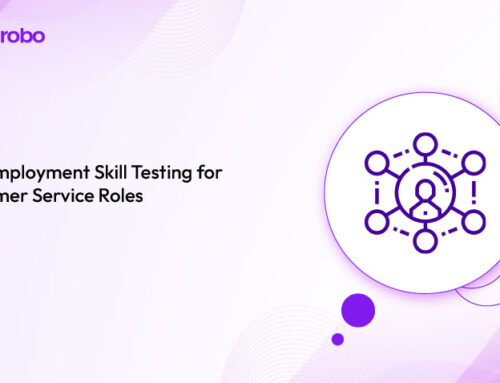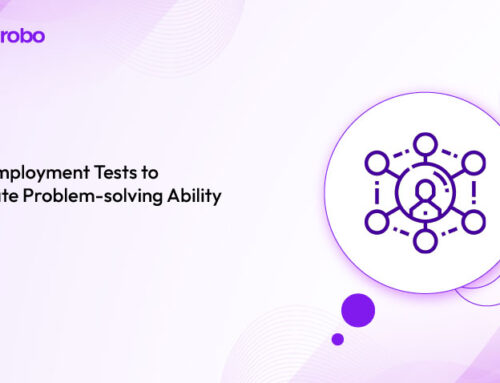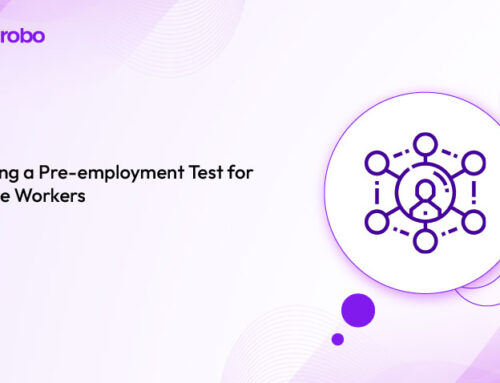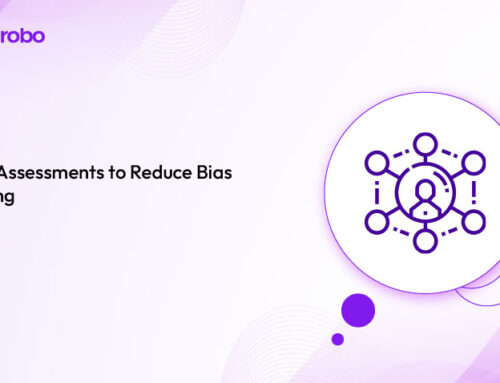
Key Takeaways
- Clerical skills form the operational backbone of organizations, ensuring everything runs efficiently and accurately.
- A structured clerical skills assessment helps objectively evaluate candidates’ data entry, communication, and organizational competencies.
- Pre-employment clerical tests reduce the risk of mis-hires, speeding up the hiring process and boosting team productivity.
- Platforms like Skillrobo’s administrative assessment solutions simplify clerical hiring through customizable, secure, and role-specific testing.
Understanding Clerical Skills in the Modern Workplace
Gone are the days when clerical work was limited to filing papers and answering phones. Today, clerical skills encompass a broad set of competencies that are essential for ensuring smooth administrative operations. As the modern workplace evolves with digital tools and complex workflows, clerical employees must be adaptable, detail-oriented, and tech-savvy. These skills ensure that the daily operations of an organization run smoothly, accurately, and efficiently, forming the foundation for business success.
Core clerical skills include –
1. Data Entry and Management
Accurately inputting, updating, and maintaining records is a fundamental clerical skill. Proficient clerical workers are responsible for managing sensitive information, ensuring current databases, and providing reliable data that drives business decisions. An error in data entry can lead to compliance issues or operational inefficiencies, making precision critical.
2. Communication Skills
Clear, concise communication—both verbal and written—is essential within and outside the organization. Clerical employees often draft emails, handle phone calls, prepare reports, and interact with clients and vendors. The ability to convey information effectively fosters better collaboration across departments and strengthens external relationships.
3. Organization and Filing
Systematic management of schedules, documents, and workflows is at the heart of clerical work. Proper organization ensures that important documents are easily retrievable and that tasks are prioritized correctly. Whether it’s managing executives’ calendars or filing confidential records, strong organizational skills directly impact workplace productivity.
4. Basic Computer Proficiency
Modern clerical roles require proficiency in office software like Microsoft Office Suite, spreadsheets, and online communication tools such as Slack, Zoom, and cloud-based filing systems. Basic technical skills help clerical workers navigate digital platforms, automate routine tasks, and streamline communication, boosting overall efficiency.
5. Attention to Detail
Clerical employees must be meticulous. From reviewing documents to entering data, a strong eye for detail helps in identifying errors early, maintaining high standards of accuracy, and ensuring that administrative processes are followed correctly. This attention to detail not only prevents costly mistakes but also upholds the company’s professional reputation.
In this blog, we’ll explore why clerical skills matter more than ever and how a structured clerical skills assessment can transform your hiring process.
What Is a Clerical Skills Assessment?
A clerical skills assessment is a pre-employment test designed to evaluate candidates on essential administrative abilities required in modern workplaces. Unlike traditional hiring methods that rely heavily on resumes or interviews, these assessments provide objective, measurable insights into a candidate’s real-world competencies. By simulating actual work scenarios, clerical skills assessments help employers gauge how well an individual can perform the tasks necessary for success in administrative roles.
Typically conducted online, these assessments can be tailored to fit specific job requirements and organizational needs. They allow hiring managers to identify candidates who not only have the right qualifications on paper but also demonstrate the practical skills necessary for maintaining smooth office operations.
Common areas assessed include:
1. Typing Speed and Accuracy
Candidates are evaluated on how quickly and accurately they can type. High typing proficiency ensures that clerical employees can handle large volumes of documentation, correspondence, and data entry efficiently without introducing errors.
2. Data Entry Skills
Assessments measure the ability to input information quickly and precisely into various systems. Strong data entry skills are crucial for maintaining accurate records, processing client information, and supporting decision-making through reliable data.
3. MS Office Proficiency
Knowledge of Microsoft Office tools, including Word, Excel, Outlook, and PowerPoint, is tested to ensure candidates can create documents, manage spreadsheets, and communicate effectively using standard office software.
4. Email Communication Etiquette
Candidates’ understanding of professional email formats, tone, and etiquette is evaluated. Since administrative staff frequently communicate with clients and colleagues via email, maintaining clarity and professionalism is critical.
5. Document Organization and Filing Knowledge
This area tests how well candidates can organize, categorize, and manage physical or digital documents. Proper filing practices ensure that records are easily accessible and that workflows remain efficient and compliant.
6. Basic Math and Reasoning
Simple math and logical reasoning assessments ensure candidates are capable of handling tasks such as processing invoices, managing budgets, and solving routine problems that arise in administrative work.
You can explore different types of assessments to organize your hiring process effectively here. Choosing the right clerical skills assessment can significantly enhance the quality of your hiring decisions, ensuring that only the most capable and detail-oriented candidates join your administrative team.
Why Clerical Skills Matter in Hiring
Clerical employees are the backbone of administrative operations. They provide the essential support that keeps organizations running efficiently behind the scenes. Without strong clerical support, companies risk disorganized processes, communication breakdowns, and costly errors that can affect everything from client relationships to internal project deadlines.
Here’s why clerical skills are critical:
1. Efficiency
Skilled clerical workers are experts at streamlining scheduling, correspondence, and documentation processes. They know how to prioritize tasks, handle multiple assignments simultaneously, and ensure that daily operations proceed without bottlenecks. Their efficiency helps teams stay productive and focused.
2. Accuracy
Administrative work demands a high level of precision. Whether it’s entering client information, preparing financial documents, or managing internal reports, clerical staff with strong attention to detail ensure that errors are minimized. Accurate work safeguards the company against compliance issues and enhances overall credibility.
3. Customer Service
In many organizations, administrative staff are the first point of contact for clients, partners, and vendors. Their communication skills and professionalism set the tone for the company’s image. A positive interaction with clerical employees can strengthen client trust, while a poor experience can have lasting negative effects.
4. Support for Management
Proper clerical work frees leadership to concentrate on strategic initiatives rather than getting bogged down in administrative tasks. When executives can rely on clerical staff to manage documentation, scheduling, and internal communications efficiently, they can dedicate more time to growth, innovation, and decision-making.
As discussed in the guide on hiring admin through administrative skill tests, a well-designed clerical skills test ensures that new hires can handle the real pressures of modern office administration. These assessments evaluate candidates on their ability to manage tasks accurately and efficiently, helping organizations hire the best talent and avoid costly onboarding mistakes.
Types of Clerical Skills Tests
Clerical skills tests come in a variety of formats depending on the specific demands of the job role. Some positions may require only basic administrative skills, while others need more advanced technical abilities or specialized knowledge. Choosing the right type of test ensures that candidates are assessed on the skills most relevant to their responsibilities. Here are some of the most common types of clerical skills tests you might consider:
| Test Type | Skills Measured | Best for |
|---|---|---|
| Typing Test | Speed and accuracy of typing | Data entry clerks, office admins |
| MS Office Skills Test | Proficiency in Word, Excel, Outlook | Office managers, coordinators |
| Data Entry Test | Accurate input and management of data | Administrative assistants |
| Document Filing Test | Logical organization of information | Records managers |
| Communication Test | Professional email and phone communication | Customer support, office admins |
By customizing pre-employment clerical tests through platforms like Skillrobo, recruiters can create assessments that are precisely aligned with the demands of each job role. Instead of relying on one-size-fits-all evaluations, Skillrobo allows hiring teams to choose the specific skills, difficulty levels, and question types that best match the tasks candidates will perform.
This targeted approach ensures a more accurate measure of real-world competencies, helping organizations identify the most qualified candidates quickly and efficiently.
How to Create an Effective Clerical Skills Assessment
Creating a well-rounded clerical skills assessment is key to identifying the right candidates who can thrive in administrative roles. A carefully designed test evaluates both technical abilities and essential soft skills, ensuring you make informed hiring decisions. Follow these steps to build an effective assessment process:
1. Identify Key Job Skills
Start by reviewing the job description thoroughly. Is the clerical role more focused on customer service, heavy data management, or internal coordination? Pinpoint the core competencies needed for success, such as typing speed, organizational skills, data accuracy, or communication abilities. Clearly defining these skills allows you to create an assessment that reflects the actual day-to-day requirements of the job.
2. Select Relevant Tests
Choose specific tests that simulate real job tasks rather than relying on generic assessments. For instance, if the role involves scheduling meetings and managing records, a basic office skills assessment might include tasks like creating sample documents, managing virtual calendars, or drafting professional emails. Relevant testing ensures that candidates demonstrate their readiness for the challenges they will face.
3. Set Realistic Benchmarks
It’s important to determine minimum acceptable scores for each skill area. Setting clear benchmarks ensures that evaluations are consistent and fair across all candidates. Use past performance data or industry standards as a guide to establish realistic thresholds that reflect what’s truly needed for success in the role.
4. Include Behavioral Assessments
Technical skills are vital, but clerical employees also need strong soft skills such as teamwork, reliability, time management, and adaptability. Including behavioral assessments alongside technical tests can give a fuller picture of a candidate’s potential. Identifying personality traits helps further enhance your hiring process and build stronger teams.
5. Ensure Test Integrity
A well-designed assessment should be secure and reliable. Use secure testing platforms with anti-cheating measures such as browser lockdowns, timed questions, and remote proctoring to maintain the credibility of your hiring process. For more guidance, check out the best practices for avoiding online assessment cheating and ensuring that test results accurately reflect candidate abilities.
Benefits of Using Pre-Employment Clerical Tests
Adopting clerical skills tests during the hiring process offers numerous advantages that go beyond simply screening resumes. These assessments create a more efficient, transparent, and successful hiring experience for both employers and candidates. Here’s why they’re worth integrating into your recruitment strategy –
1. Objective Screening
Skills tests offer a clear, unbiased measure of candidate abilities. Rather than relying solely on subjective impressions from interviews or resumes, assessments provide quantifiable data that make hiring decisions more objective and consistent across the board.
2. Faster Shortlisting
By testing core competencies early in the hiring process, you can quickly eliminate unqualified candidates and focus your attention on top performers. This not only speeds up the hiring timeline but also reduces administrative overhead, allowing your HR team to work more efficiently.
3. Higher Retention Rates
When you hire candidates who genuinely match the demands of the job, they are more likely to feel competent, succeed in their roles, and remain with the company longer. Clerical skills tests help ensure a better fit, ultimately improving employee satisfaction and reducing turnover costs.
4. Better Candidate Experience
Candidates appreciate a structured, transparent hiring process. Clear expectations and well-organized assessments help candidates understand what the role entails and how they are being evaluated. This professional approach enhances the employer brand and creates a positive first impression among potential hires.
When paired with behavioral assessments like the Dark Triad Test, recruiters can go a step further by evaluating candidates’ cultural fit, emotional intelligence, and interpersonal skills. This combination ensures you not only hire for skill but also long-term success within your organizational culture.
Common Mistakes to Avoid When Assessing Clerical Skills
While clerical skills assessments are incredibly effective, they must be implemented correctly to truly improve hiring outcomes. Avoiding common mistakes ensures that your evaluation process remains fair, comprehensive, and aligned with job needs.
1. Testing Only Technical Skills
It’s easy to focus solely on technical abilities like typing speed or MS Office proficiency, but soft skills matter just as much. Attributes like reliability, teamwork, communication, and adaptability are critical for clerical success. Make sure your assessments capture both technical and behavioral competencies for a complete view of candidate potential.
2. Using One-Size-Fits-All Tests
Not every clerical role demands the same skills. A front desk assistant may need excellent customer service skills, while a data entry specialist may require extreme accuracy and speed. Customizing assessments based on the specific role ensures you evaluate the most relevant abilities, improving hiring precision and reducing mismatches.
3. Neglecting Mobile Compatibility
Many candidates today prefer to complete assessments on their smartphones or tablets. If your clerical skills test isn’t mobile-friendly, you risk creating barriers for otherwise qualified candidates. Ensure that your testing platform offers seamless functionality across all devices to provide a positive and accessible candidate experience.
4. Skipping Internal Validation
Before rolling out assessments externally, it’s crucial to test them internally. Internal validation helps identify technical glitches, confusing questions, or unrealistic benchmarks. By trialing your assessments with current employees or small groups, you can fine-tune the process and ensure it truly measures the skills you intend to evaluate.
How Skillrobo Simplifies Clerical Skills Assessments
When it comes to building and administering effective clerical skills assessments, Skillrobo makes the process seamless and efficient. With a focus on customization, security, and user experience, Skillrobo offers powerful solutions tailored specifically for administrative hiring.
1. Pre-built clerical skills tests tailored to office roles:
Skillrobo provides a wide library of ready-to-use assessments designed to measure essential clerical competencies like typing, data entry, MS Office proficiency, and communication skills. These tests are crafted to reflect real-world administrative tasks, making evaluation quick and relevant.
2. Customization options to create job-specific challenges:
No two administrative roles are identical. Skillrobo allows recruiters to customize tests based on specific job descriptions, ensuring candidates are assessed on the exact skills needed for success in their role.
3. Real-time analytics for candidate performance:
Skillrobo’s platform offers detailed, real-time performance insights, helping recruiters quickly spot top performers. Analytics dashboards provide scores, completion times, and comparative benchmarks, making shortlisting more data-driven and accurate.
4. Secure test environment to prevent fraud or cheating:
With built-in security features like browser lockdowns, time limits, and remote proctoring options, Skillrobo ensures test integrity is maintained throughout the hiring process, giving recruiters confidence in the results.
5. Mobile-friendly testing for candidates anywhere, anytime:
Skillrobo’s platform is optimized for all devices, including smartphones and tablets. Candidates can complete assessments from any location, providing greater flexibility and enhancing the candidate experience without compromising on test quality.
With Skillrobo, recruiters can assess typing speed, data management, MS Office skills, email etiquette, and overall communication proficiency—all within a single, integrated platform. This saves recruiters valuable time, ensures consistent evaluations, and boosts the overall quality of hiring decisions.
Conclusion: Strong Clerical Skills Build Strong Teams
Clerical roles are vital to every organization’s operational success. From managing records and coordinating schedules to supporting customer interactions, skilled clerical employees keep processes running efficiently and accurately. With a well-structured clerical skills assessment strategy, companies can ensure they hire candidates who bring precision, organization, and professionalism to the workplace.
Using a platform like Skillrobo streamlines the hiring process, minimizes hiring risks, and ensures you onboard administrative talent that’s fully equipped to thrive from day one. Skillrobo’s pre-employment clerical tests help recruiters make smarter, faster, and more reliable hiring decisions, building stronger administrative teams that support long-term business success.
Sign up and explore Skillrobo’s pre-employment clerical tests today and start building a more efficient and capable workforce!
Frequently Asked Questions
1. What are the essential clerical skills employers look for?
Employers typically seek skills such as accurate data entry, strong typing speed, clear written and verbal communication, organizational abilities, and proficiency in office software like Microsoft Word, Excel, and Outlook. These core competencies help maintain smooth office operations.
2. How do pre-employment clerical tests improve hiring?
Pre-employment clerical tests provide objective validation of skills, eliminating guesswork from the hiring process. They allow recruiters to streamline shortlisting, identify best-fit candidates faster, and make hiring decisions based on real performance rather than just resumes or interviews.
3. Can clerical skills be assessed remotely?
Yes, absolutely. Platforms like Skillrobo offer secure, online, and mobile-friendly clerical skills assessments that candidates can complete from anywhere. This makes it easy to evaluate candidates quickly, even in remote or hybrid hiring setups.
4. Are soft skills important in clerical hiring?
Definitely. While technical abilities are essential, soft skills like teamwork, reliability, professionalism, and communication are equally important for administrative roles. A combination of both technical and soft skills ensures clerical employees can contribute effectively to team goals.
5. How does Skillrobo enhance clerical hiring?
Skillrobo enhances clerical hiring by offering customizable, role-specific clerical skills assessments with features like real-time analytics, secure testing environments, and mobile access. Recruiters can accurately gauge both hard and soft skills, leading to better hiring outcomes and improved team performance.
Table of content
- Key Takeaways
- Understanding Clerical Skills in the Modern Workplace
- What Is a Clerical Skills Assessment?
- Why Clerical Skills Matter in Hiring
- Types of Clerical Skills Tests
- How to Create an Effective Clerical Skills Assessment
- Benefits of Using Pre-Employment Clerical Tests
- Common Mistakes to Avoid When Assessing Clerical Skills
- How Skillrobo Simplifies Clerical Skills Assessments
- Conclusion: Strong Clerical Skills Build Strong Teams
- Frequently Asked Questions









